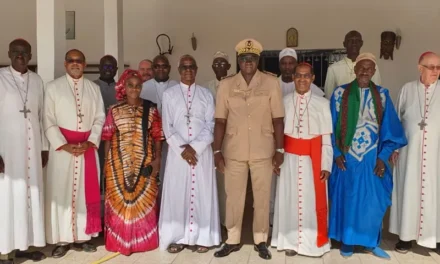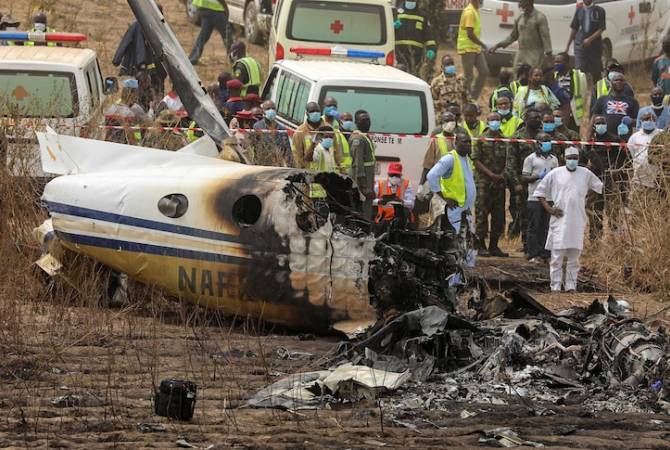TODAY WE TAKE UP THE SECOND SEGMENT OF OUR WEBINAR
The next question focused on the role of women in the church. This question was addressed to Sr. Solange Sia who is a lecturer at the Catholic University in Abidjan. She categorically stated that their role in the Church as women should be a compliment. She took us on a historical journey into the Bible where we see what women did and then she put the role of women in the scriptures side by side with the contribution of women in the Universal Church. She expressed gratitude to the Holy Father and the Vatican Authority for what is presently going on already in Rome. In her submission, it is with great thanks that she appreciated the appointment of Three women into the dicastery for the selection of bishops in the Universal Church. It is therefore interesting to note that these three women participate in choosing who will be the bishop and this is already an example to indicate that the Universal Church should imitate the Roman curia in according to woman their proper place in the service of the Church.
There is also an urgent need for the engagement of women in parishes like in the Parish councils. This inclusive tendency should be encouraged as an endeavor to work on the structures of governance of the Church in line with what Rome is already doing presently. Concretely there are places that you would like the Church to pay attention to, number one is the formation and training of women. She is optimistic that if women are to be in good positions in the Church or have to be been chosen to be in certain higher positions, it is because they have the competence, so if they do not have the competence, they cannot be chosen, it becomes crucial therefore that our women should be trained and well to enable them to respond to the current challenges currently starring them on their faces in our Universal and local Churches today.
Secondly, when women are well formed, they can intervene in so many other aspects of the life of the Church as in teaching like herself. She teaches in the University as we earlier stated. It is important to note that she is teaching there because she has the competence, so if more women are given the training and the competence they require, they can also enter into these institutions and be able to influence things even at the level of the economy. if women are given adequate training and are well-formed, their self-confidence is guaranteed. With this confidence, they can intervene even in the economic life of the church. One other aspect is the care of the weak and the vulnerable. This is something women can also do very well but for them to do this they also need to be trained.
At this point, Bishop Badejo Emmanuel stepped in to discuss digital culture in a synodal Church since digital culture represents a fundamental change in the way we conceive reality today. Today everyone sees the digital environment as a mission territory how then would one envisage the mission of the Church in this domain with particular reference to our African reality?
Bishop Bedejo began by explaining that the topic of digital culture especially as it is treated in number 17 of the synodal report synthesis report clearly shows that if there is any area of the Church’s life that concerns practically everybody, Bishops, religious, priests, and lay people and all outside the church it is precisely communication. To this end, digital culture is one area which nobody can run away from. It is an area that nobody can avoid. Even the Church has often emphasized. It has become an affair of both the present and the future and it concerns all because we live in an evolving world.
To appreciate the question that has been posed to me, there are three main variables, one digital culture two the synodal Church three the African reality. The synodality has been tagged to be the new way of being Church which we must all embrace just like we cannot run away from digital culture. The characteristics of synodality have been mentioned already today and we have acquired enough knowledge of it by listening to the deliberations of one another. There is therefore an urgent need for dialogue and accompaniment ensuring that we carry along everybody and leave nobody behind. Those are precisely the claims that communication aims at bringing people into communion with one another. In the Church of Synodality, we attempt to listen to the margins, to make sure that everybody has a say and has a contribution to make. In digital culture there is what appears to be an illusion that communication culture and digital culture make things happen but as Archbishop Tamba said even in digital culture there are Gatekeepers, those who determine and know what groups move with what groups, what ideas become the major ideas to be discussed. Even the fact of access is itself a form of gatekeeping.
Bishop Badejo added that there are people who have gotten the tools that they need like the telephone, the iPad, etc. Some have electricity and others don’t. So, in certain ways, digital culture gives us the impression of being able to reach everybody. But often it does not reach everybody’s body and it leaves people behind. However, the future of the world is that everybody is going to be connected digitally. The view of the world is that the most important segment of society today, the most dynamic segment of society is the young people, the young priests, the seminarians, the young sisters, those who are coming into our institutions, etc. are people of the digital age who are called the natives of digital culture. that is why as far as digital culture is concerned some of us may find the entire culture absurd and some others find it pretty natural but the fact is that it is the future and that is where the Church is going.
These characteristics that are particular and peculiar to digital culture give us a new process of learning a new way of perceiving one another, a new way of relationship, new Concept of space and time. He indicated that people can have relationships with people they have never met. They can have relationships with people that they really don’t know both the truth about them. So in this kind of circumstance what the question asks us is if digital culture is an essential part of a synodal Church and what is the “Africanness” that we bring into it or what is the peculiarity of the African Church that will have to be maintained and sustained for us to exist as a synodal Church within a digital culture. My opinion he said is, that the main themes of synodality which have been mentioned here today as communion, participation, and Mission are themselves essentially themes of communication. He opined that if we take any of those themes without communication, they cannot practically exist. Also, if you want people to participate in any event or participate in any conversation, it is a function of communication. If it’s going to be effective, communication itself suggests communion and that is what we can call the root word.
Communication bringing people together and it is practically impossible to embark on any Mission without communication because mission is about Building Bridges between different cultures, different Generations, different geographical locations and so on and so forth. These three things have an affinity with our African existence. Everybody will agree with that the most important theme for the African Church today is the theme of the family that’s why the Bishops of Africa in the synod of 1994 chose as a permanent characteristic and theme for the Church “the church as family of God”. When we talk about family, there are certain things that are natural to a family; communion, consultation, friendship, etc. making sure that everybody is carried along. Ordinarily, families that don’t have those characteristics cannot be called good families. I remember very well in the preparation towards the Synod, the big discussion for those who participated in the final consultation in Adis Ababa was whether to maintain the theme of the family as the defining theme for the Church in Africa or to agree on a new theme.
Earlier, certain people described the Church as a Tent. But the tent does not express the identity of its inhabitants as a family. A tent is a place where anybody can just come in through the left and go away through the right. Here there is no real characteristic and no real identity but Africa struggled to keep the concept of family as her identity. Continuing, Bishop Badejo affirmed that even in adopting digital culture in a synodal Church, the theme of the family must continue to be emphasized. There are some images of the family that we know and some of them come with African languages. From the East Africa we have the dictum, ‘Ubuntu’ which simply implies, ‘You are because we are’ ‘I am because you are’. These are some of the characteristics of a communality in Africa can simply not be discarded very easily.
He informed participants that recently the dicastery for communication in the Vatican released a document to educate our young people about participation in the digital culture. This document is entitled ‘Towards full presence, a pastoral reflection on participation in digital culture’. What this document tried to do is to insist that we must be present on digital culture whether we are old or young, whether we are men or women and whether we are children or adults. It is a necessity because we have a duty to infuse digital culture with the values that we believe in not only Christian values but also African values. In fact, that document appeals that we should teach one another to become co-creators of content on digital culture because those who dominate, manipulate and sometimes exploit digital culture are those who create the contents that attract the attention of millions of people. That document calls on us to become missionary influencers now and if we are going to be missionary, we have to have influence from our own point of view.
Unfortunately, too many people think about influencers as people who have a million followers or10 million followers but not all. Every one of us as Christians have some influence on somebody else and that influence increases with our capacity to manage digital culture. So it becomes obligatory that all of us must make the effort and therefore as Father Vitalis said in his introduction, the values of co-responsibility, consultation, our stories and our idioms, our Parables etc. must not be left behind because our African stories teach the kind of content that cannot be matched by what is coming on today. At the same time, we have to make the effort to ensure that we turn our young people to allies not subjects.
The bishop acknowledged that this is very important since for too long in African culture, young people and children are looked at like subjects of what the adult already knows but it is important now to see them as allies that means the adult, the grandfather, the grandmother etc., have a perspective but these young people too have a perspective and once they are brought in as friends and allies they will be ready to carry the message of the Gospel which is the message of the Church wherever they go. This implies that they will become digital missionaries, they become digital influencers, they become collaborators and they become even co-creators on the digital space. But when they create, they create with the background of the culture that we have infused in them with the confidence that they are also friends of what the Church teaches and they are not just subjects or Outsiders. Therefore, it is important for the African Church to embark on a process of formation and the strategy must be carefully chosen to form these foot soldiers.
In conclusion, this fiery prelate announced that today, many companies in the economic world are transiting from analog performances or analog operations to digital operations.
This implies that the things they do mainly is to train those who are going to ensure the transformation from the analog experiences to the digital experiences. In this regard, church cannot be left out. If today we are going to influence the world in a way that is synodal and be influenced by Christian values, we have to begin to form and seriously train our digital missionaries and influencers, and those will be our seminarians, the students in our institutions, our children in our schools and even those who are involved in any kind of formation. Let us not forget that the family has a role to play. He added that he is glad to say that he just arrived five minutes before this meeting from the National Conference of the Catholic artists and entertainers Association of Nigeria that has been organized by Signis Africa and this is precisely what they went to discuss that they themselves have to become formators of others as they are being formed. Again, whenever and however at any time they are on the digital space, they become missionary influencers and what we call allies and collaborators and co-creators of the digital space. He stopped here and thanked every participant present for their rapped attention.
- CATHOLIC ARCHBISHOP IN GHANA HAILS POPE LEO XIV AS GOD’S GIFT - 23 mai 2025
- POPE LEO XIV TO APPROVE CANONIZATIONS - 22 mai 2025
- THE EVOLUTION OF PAPAL TRANSPORTATION - 20 mai 2025






